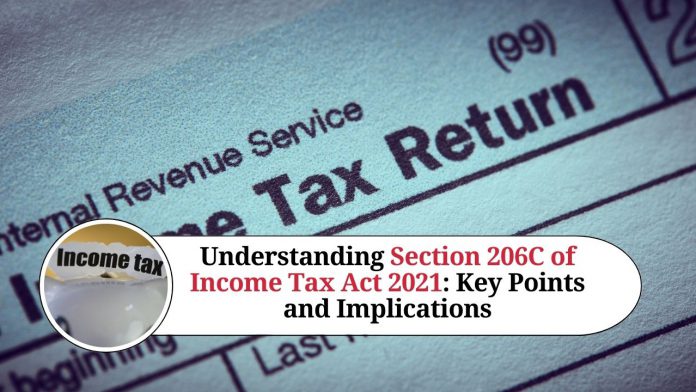Section 206C of the Income Tax Act 2021 is a provision that deals with the collection of tax at source (TCS) on certain specified transactions. This provision has been introduced with the aim of widening the tax base and ensuring that tax is collected at the source itself, rather than relying on taxpayers to voluntarily report their income.
In this blog, we will discuss the key points of Section 206C and its implications for businesses and taxpayers.
What is Section 206C?
Section 206C mandates that any seller receiving consideration for the sale of goods exceeding INR 50 lakhs in a financial year must collect TCS from the buyer at a specified rate. Similarly, any seller receiving consideration for providing any services exceeding INR 50 lakhs in a financial year must collect TCS from the buyer at a specified rate.
The rate of TCS varies depending on the type of transaction. For instance, the TCS rate on the sale of goods is 0.1%, while the TCS rate on the provision of services is 0.5%. However, if the buyer is exempt from tax or if the buyer provides a declaration that the goods or services are meant for personal use and not for business purposes, then TCS does not apply.
Who is liable to collect TCS?
Section 206C places the liability to collect TCS on the seller, who is required to collect the tax at the time of receipt of consideration from the buyer. The seller must then deposit the TCS with the government within a specified time frame, failing which penalties and interest may be levied.
What are the implications of Section 206C?
Section 206C has several implications for businesses and taxpayers. Firstly, it increases the compliance burden for businesses that are required to collect TCS. They must ensure that they are collecting the correct amount of TCS, depositing it on time, and maintaining records of TCS collected.
Secondly, it may increase the cost of doing business for buyers who are required to pay TCS. This may make certain goods and services more expensive, which could impact consumer behavior and market dynamics.
Finally, Section 206C may help the government widen the tax base and increase revenue collection. By collecting tax at the source, the government can ensure that tax is collected even from those who may not have voluntarily reported their income.
Conclusion
Section 206C of the Income Tax Act 2021 is a provision that mandates the collection of tax at source on certain specified transactions. While it may increase the compliance burden for businesses and the cost of doing business for buyers, it could also help the government widen the tax base and increase revenue collection. Businesses and taxpayers must ensure that they are aware of the provisions of Section 206C and comply with them to avoid penalties and interest.
Read more useful content:
- section 145 of income tax act
- section 10e of income tax act
- section 9 of the income tax act
- section 94b of income tax act
- section 206aa of income tax act
Frequently Asked Questions (FAQs)
Q. What is Section 206C of Income Tax Act 2021?
Section 206C is a provision in the Income Tax Act 2021 that mandates the collection of tax at source (TCS) on certain specified transactions.
Q. What transactions are covered under Section 206C?
Section 206C covers transactions where the seller receives consideration for the sale of goods exceeding INR 50 lakhs in a financial year, or consideration for providing any services exceeding INR 50 lakhs in a financial year.
Q. Who is liable to collect TCS under Section 206C?
The seller is liable to collect TCS under Section 206C. They must collect the tax at the time of receipt of consideration from the buyer.
Q. What is the TCS rate under Section 206C?
The TCS rate varies depending on the type of transaction. For sale of goods, the TCS rate is 0.1%, while for providing services, the TCS rate is 0.5%.
Q. Who is exempt from TCS under Section 206C?
Buyers who are exempt from tax, or who provide a declaration that the goods or services are meant for personal use and not for business purposes, are exempt from TCS under Section 206C.
Q. What are the implications of Section 206C for businesses?
Section 206C may increase the compliance burden for businesses that are required to collect TCS. They must ensure that they are collecting the correct amount of TCS, depositing it on time, and maintaining records of TCS collected.
Q. What are the implications of Section 206C for buyers?
Section 206C may increase the cost of doing business for buyers who are required to pay TCS. This may make certain goods and services more expensive, which could impact consumer behavior and market dynamics.
Q. What happens if TCS is not collected or deposited on time?
If TCS is not collected or deposited on time, penalties and interest may be levied.
Q. How can businesses comply with Section 206C?
Businesses can comply with Section 206C by ensuring that they are aware of the provisions of the section, collecting the correct amount of TCS, depositing it on time, and maintaining records of TCS collected.
Q. When did Section 206C come into effect?
Section 206C came into effect on April 1, 2021.




















